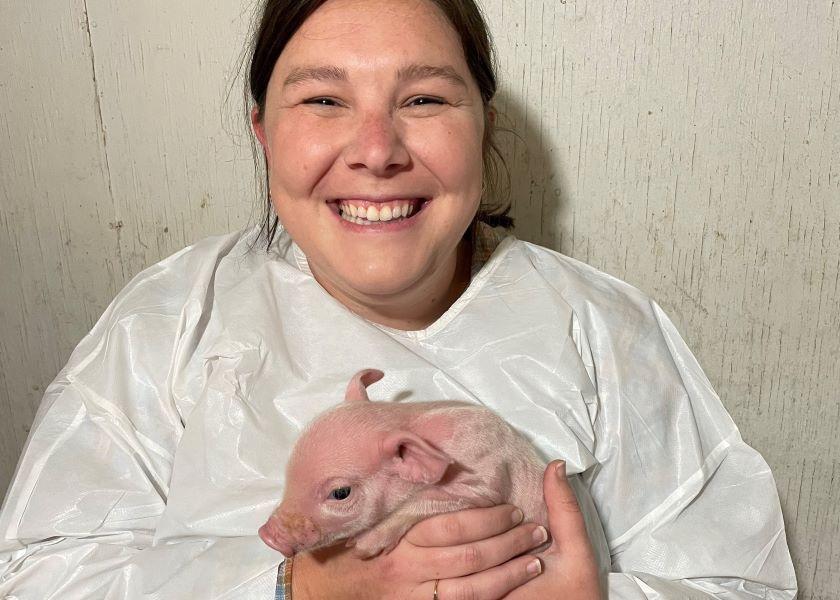Bring Back Field Trips

I saw a joke on the internet saying that field trips are wasted on children. Adults are much more appreciative of a day out of the office to expand their mind, get out of their comfort zone, and learn something new. Of course, that’s just a joke – kids need field trips, but as someone that works at a computer most days, it really resonated with me! Fortunately, I had the opportunity to go on a field trip recently with the North Carolina Department of Ag team as we toured one of their employee’s family pig farms.
When being greeted by our hosts for the day, they expressed how happy they were that we came to see what they do. Their hope for us was that we would leave with a passion to share more about what they’re doing with others removed from agriculture. Those of us working in agriculture tend to have great pride in what we do and a drive to share our story. Opening up our farms to share it with others is one of the best ways to do this.
As someone who works in agriculture, I have both hosted and participated in many farm tours. While there are many good reasons to open ourselves up to visitors, there are also several reasons to be hesitant. Do you have the time? Are you concerned about biosecurity? Who will the audience be? These are just a few things to start thinking about.
I have crowdsourced some words of wisdom from professionals in the agriculture education space that you can use as a reference if you are just starting out.
• Be open-minded. Your audience might not have ever visited a farm before, let alone seen how pigs are raised. Their questions are often not meant to be offensive, just curious.
• Actions speak louder than words. Show people happy, healthy animals instead of simply telling them about your welfare practices.
• Find a way to stay connected. Start a conversation and always follow up if you can.
• Practice farm security. If you do decide to open your farm or facility up to visitors to connect and share your story, make sure you’re also considering how to protect yourself in these situations from those who are adamantly opposed to animal agriculture. Animal rights extremists use several tactics to gain entry into agricultural facilities and threaten to “expose” us by taking photos and videos out of context. In some cases, extremists have even stolen animals from facilities as part of their campaign of “open rescues.” It’s important to make sure you have thought through these situations and made yourself a harder target. All farms and agricultural facilities, regardless of hosting visitors, should always make sure they are up to date on their security policies. It’s important to have a secured area with fencing, gates that lock, security cameras, proper lighting, etc. All employees at your location should be aware of these procedures and never allow anyone on the property that wasn’t expected or can’t provide proper identification. Extremists often show up to farms posing as “inspectors,” “insurance adjusters,” or anyone else that they think can help them gain access. When in doubt, always err on the side of caution.
The Animal Agriculture Alliance prides itself on being a top resource for farm security recommendations. However, we don’t want a small group of people opposed to animal agriculture to stop us from sharing the important work we do. To think through preparation for an upcoming farm tour, consider the “5 W’s” – who, where, what, when, and why.
• Who are you hosting? How did they find you? Did they come recommended by a reputable source, a school group, or from a Google search?
• Where will the farm tour take place? It’s important to distinguish if any areas of your farm or facility are “off limits.” Do you want visitors to enter a certain way for biosecurity purposes?
• What are you okay with sharing? Can visitors take pictures and share on social media? Make sure you provide context for anything visitors may have questions about! Consider having subject matter experts, like your veterinarian or nutritionist, on hand to help with tough questions.
• When is it a good time? Have you thought through your plan for visitors? You shouldn’t rush before you’re ready or host on a day that isn’t ideal for you and your team.
• Why? This is the reason we’re all here! To share our story and write our own narrative instead of letting those who oppose animal agriculture tell it for us.
As you think about hosting visitors and customers at your farm or facility, we hope you have a positive experience and continue to spread the passion that you have as people involved in agriculture.
Read More:
Activists Continue to 'Storm the Courts'
Pork is Under Pressure
Let's Celebrate Some Wins in the Pork Industry







